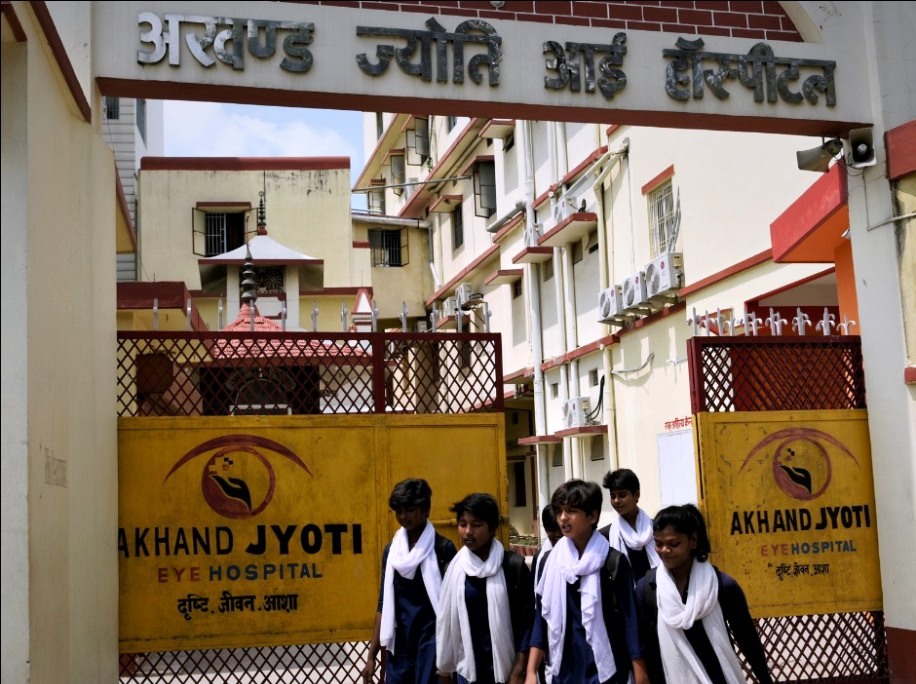Standard Chartered Bank in partnership with Akhand Jyoti announced the launch of an Eye Care Academy in Mastichak, Bihar, as part of their ongoing commitment to empowering underprivileged communities through education and healthcare initiatives.
The Standard Chartered-Akhand Jyoti Eye Care Academy aims to provide comprehensive optometry education and training to 95 girls from underprivileged backgrounds over a span of four years, enabling them to attain a Bachelor of Optometry degree. The academy will offer a comprehensive curriculum, hands-on training, and mentorship opportunities, equipping students with the expertise and confidence to contribute effectively to the field of optometry upon graduation. Post completion of this training, they will be empowered to practice their skills with Akhand Jyoti, one of the leading eye care institutions in India or with any other institution depending on their requirements.
This academy marks the third such collaboration by Standard Chartered Bank, following successful partnerships with L V Prasad Eye Institute in Hyderabad and Dr Shroff’s Charitable Eye Hospital in Delhi. So far, more than 3900 individuals have been trained from these two institutions over the last four years.
India bears a substantial burden of blindness, with one-fourth of the world’s blind population. The economic impact of blindness in India is staggering, with an estimated Rs. 159 billion in costs and Rs. 2,787 billion in lifetime losses.
Standard Chartered, under its flagship “Seeing is Believing” program, has been working on bridging this gap since 2003. Through Standard Chartered support, more than 500 vision centres have come into existence and over 3.6 million surgeries have been conducted. With such a robust primary infrastructure in place, “Seeing is Believing” has distributed over 6 lakhs spectacles to underprivileged community. However, availability of trained staff is a challenge towards achieving the goal to eliminate avoidable blindness.
India currently faces a shortage of optometrists, with rural areas being particularly underserved. With a ratio of 1 ophthalmologist to every 219,000 people in rural India, the need for trained eye care professionals is of vital and critical requirement. Quality eye care services rely heavily on Optometrists. These people are crucial in addressing blinding conditions through early detection, treatment, and rehabilitation. However, a severe shortage of skilled personnel in India, hinders the delivery of quality eye care services. A well-trained Optometrist can enhance efficiency, productivity, and patient satisfaction in eye care programs, acting as a bridge between specialists and communities.
Karuna Bhatia, Head Sustainability, Standard Chartered Bank and Global Business Services, India said, “At Standard Chartered, we believe in the power of education to transform lives and communities. The Standard Chartered-Akhand Jyoti Eye Care Academy reflects our commitment to providing opportunities for underprivileged girls to pursue careers in optometry, empowering them with skills and knowledge that will have a lasting impact on their futures and the communities they serve.”
Mritunjay Tiwary, Founder and Executive Trustee of Akhand Jyoti Eye Hospital, said, “The support from Standard Chartered Bank towards creating this Academy is of unprecedented importance. While this program develops marginalised, rural girls into qualified Optometrist, it also develops these girls into social change agents. Upon completion of this program, when these girls become Optometrist, they lead the blindness elimination drive across Akhand Jyoti’s network of centers along with that they encourage more girls like them to come forward and join the program creating a larger societal impact. This creates a dual impact of the program, not only in producing qualified optometrists but also in empowering these girls to become agents of social change within their communities.”
Disclaimer: This media release is auto-generated. The CSR Journal is not responsible for the content.

